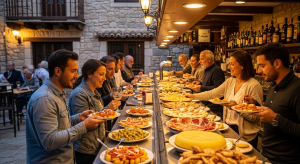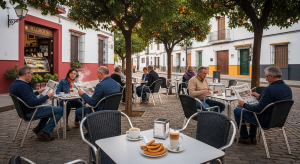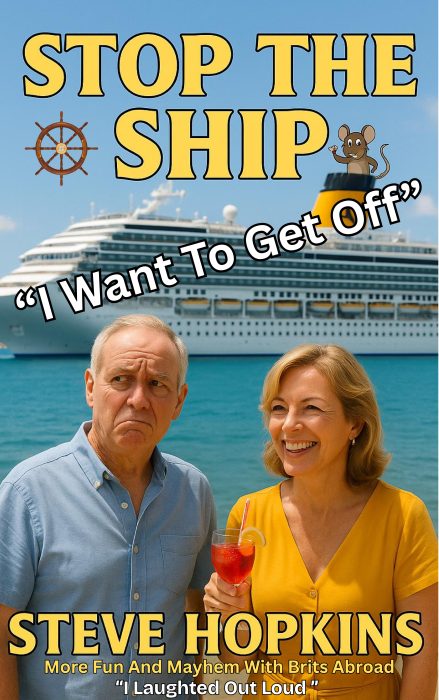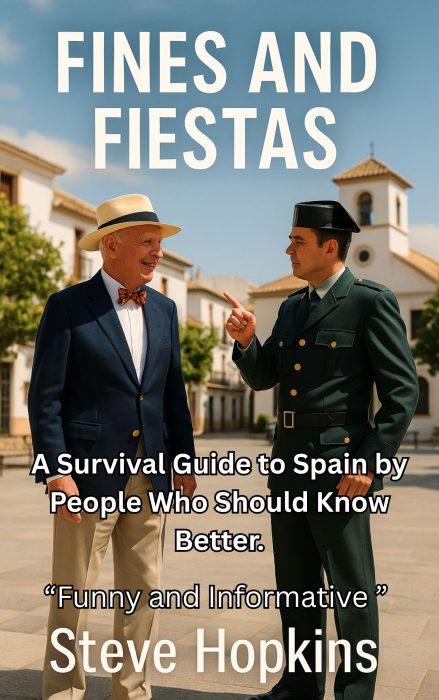Paradise Chapter 2
High Season Havoc The first rule of summer travel? Never stand still. The second? Never underestimate the lethal combination of flip-flops and false confidence. “Get out of my way. I’m late for my flight!” The words were fired at me like a starter pistol before the main event, and then she came into view—an elderly woman, though she’d clearly had a lifetime membership at the Fountain of Denial. The short red rah-rah skirt looked like it had been borrowed from her granddaughter, the floral blouse was fighting a losing battle with her ample frame, and the fake tan radiated the sort of nuclear orange glow normally reserved for warning signs in power stations. On her feet—well, one them—was a bubblegum-pink plastic flip-flop, the left already making a bid for freedom. I, Steve Hopkins, had seen a lot in my years—thirty of them spent as an international copywriter, marketing man, and reluctant globetrotter—but I’d never seen anyone use a counterfeit Louis Vuitton suitcase as a weapon of mass obstruction. She rammed her way down the moving walkway, scattering fellow travellers like tenpins, before hitting the exit ramp at what can only be described as an artificially-induced sprint. Two steps later, she lost her remaining flip-flop and ploughed straight into a human wall of passengers who were trying, and failing, to squeeze themselves into the already jammed main concourse. The walkway, blissfully unaware that it had just become part of a disaster movie, continued to deposit unsuspecting travellers into the back of the human pile-up. In less than half a minute, we had the makings of a massive rugby scrum. Those of us approaching the chaos did what any sensible Brit would do—we started walking backwards, against the belt, in a desperate bid to delay the inevitable. “Switch it off!” someone shouted. “For God’s sake, switch it off!” Ignored, of course. It wasn’t until a young man stumbled off the walkway, tripped, and slammed his shoulder into the emergency stop button that the grinding, blessed halt arrived. Silence didn’t last long. A single voice—hers—rose above the crowd. “Where’s my feckin’ flip-flop?” Welcome to peak-season air travel. The last week in July is a time when airports stop pretending they’re transport hubs and reveal their true selves—battlefields. The main concourse was already at bursting point, a human stew of frazzled parents, overexcited children, and determined drinkers making a break for the nearest bar before boarding. The lure of two weeks under a sun that didn’t require an electricity meter was enough to make the entire UK mobilise. And here they all were: pushing, shoving, dragging luggage and dignity in equal measure. Ahead of me, a family joined the gridlock at the sliding doors. The children, feral with anticipation, immediately began weaving through the crowd like eels through seaweed, disappearing under elbows and between knees. Seconds later, they were gone. Dad, realising too late that “keep an eye on the kids” was more than a figure of speech, charged into the throng with a suitcase held like a battering ram, his wife clinging to his arm. The mass swallowed them whole. From somewhere deep inside came the cry, “I’ve lost my kids!” They emerged briefly into the concourse, gasping for air like corks popped from a champagne bottle—only for the children, entirely unfazed, to reappear back where they’d started. The parents fought to turn back but the human tide was merciless, dragging them forward. “Mum! Dad!” the children shouted from the scrum’s heart. Dad spotted them, tried to retreat, failed. Mum resorted to the oldest parenting tactic in history—yelling—before both kids ducked, vanished, and somehow popped up right beside their parents. She gave the eldest a clip around the ear, then smothered them both in kisses, a confusing cocktail of punishment and reward. Meanwhile, the halted walkway became an impromptu Olympic event. Suitcases, children, wives, girlfriends, and the occasional grandmother were hoisted over the guardrails like sandbags in a flood. Fathers and boyfriends then attempted their own heroic leaps. Some landed with the grace of gazelles; others collapsed in undignified heaps, faces twisted in pain but voices determinedly light-hearted. Dignity is a fragile thing, but British male pride insists on pretending nothing hurts. Not that it mattered—they’d barely take ten steps before hitting the same brick wall of humanity blocking the entrance. I waited, marooned on the dead walkway, scanning for any sign of movement ahead. After five minutes, salvation appeared in the form of a lone airport employee, high-viz vest gleaming, ID badge swinging. Finally, I thought, someone’s going to sort this mess out. I was wrong. Five yards from the main entrance, he veered off towards an unmarked side door. He swiped his pass and the little red light blinked green. That was all the encouragement I needed. I vaulted the rail like a man half my age and landed at his side just as he cracked the door open. By then, nine of us were clustered around him, the way pigeons mob anyone holding a bag of chips. Outnumbered and clearly more interested in an easy life than protocol, he shrugged and let us in. We slipped through like escapees from a prisoner-of-war camp, hurrying down the staff corridor before anyone outside noticed. Thirty seconds later, I stepped into the concourse proper, now seeing the chaos from the other side. It was no better—just different. The crowd at the entrance was still locked in mortal combat, a living dam holding back hundreds more behind it. Then, from the mêlée, a small pink missile appeared—a single plastic flip-flop, liberated from its owner. It spun lazily through the air before landing in Zone A. The baggage handlers’ boots pummelled it into the floor before an anonymous foot punted it onwards to Zone B. I watched it disappear under the tide of travellers, only to pop up again like some indestructible carnival prize. Finally, the rah-rah-skirted owner burst from the scrum, face glowing an even deeper shade of nuclear orange, screaming: “Where’s my feckin’ flip-flop?” Her voice carried over the din, half-desperation, half-accusation, as if the missing footwear was a conspiracy against her personally. It was, after all, the first week in July—Airport Bedlam Week—and I was just getting started. This was my last inspection weekend before we surrendered both the airports and the village of Paradise to the holidaymakers for two solid months. Only one set of clients to collect, which meant that—barring a plague of locusts or an unscheduled strike—today should have been straightforward. The concourse resembled a disaster zone. Prone bodies sprawled on the floor, luggage corralled like cattle, and a departure board boasting more delays than departures. Back in the days before thirty-minute turnarounds and budget airline cattle-herding, aircraft were met by armies—cleaners, caterers, engineers, customer service staff—each playing their part. Now, planes were flogged like rented mules, flying twenty-four hours a day, and any Monday delay would snowball into a Thursday catastrophe. This Thursday was no exception. Picking my way through family encampments—marked out with hand luggage at the corners like medieval boundaries—I spotted a familiar figure at the check-in desk. “No Way Jose,” our ticketing agent, was in the middle of a losing battle with a school party. Jose’s voice, thick with his Barcelona accent, boomed across the concourse: “Rodríguez! Sánchez! López!” Each name summoned either six children or none at all. The kids, high on sugar and freedom, had discovered the perfect game: collect your boarding pass, loop back into the first group, and claim another. Jose was on the ropes, and the teachers? Nowhere in sight—probably outside chain-smoking and questioning their career choices. Finally, in a move of pure survival, Jose dealt boarding passes like a Vegas croupier, shoved the tallest child into the role of group leader, and aimed them towards the departure lounge. Within seconds, the group had scattered like confetti into the airport crowds. Sensing my chance, I called, “Hola, Jose!” He grinned, waved me forward. I began the slow, bruising push through the British ‘We Will Not Be Moved’ queue, where ‘Excuse me’ functions as an optional sound effect rather than an actual request. When I reached him, he pulled me into a bear hug. “My friend, you’ve chosen well—your flight is… completely full.” In Jose-speak, “full” meant “grossly overbooked.” He asked about my clients, ticking them off his list before ordering the check-in girl to hand over three boarding cards. “If they’ve luggage, take it to heavy loads and tell them it’s for me,” he said. “If they don’t turn up, come back. But not too late—we’ll have a numbers problem.” I paused. “What flight is the school party on?” Jose just smiled. He didn’t need to answer. It was mine. Threading back through the crowd, I passed four frantic teachers. Jose pressed boarding cards into their hands and pointed them vaguely towards security. Their faces said it all: “Yes, it’s a free trip. No, we don’t want to be here.” I waited, people-watching, as the teachers corralled the majority of the children, two playing sheepdog while the others hunted for stragglers. Behind me, Jose was now breaking the news to latecomers that they’d be bumped to a later flight, triggering a chorus of outrage in three languages. Years of travel have cursed me with an invisible neon sign—one that changes messages depending on location. At airports, today’s read: I Can Get You On Any Overbooked Flight. In the past, it’s led to me being assaulted for not being a tour rep, insulted for not knowing the location of a hire car desk in an airport I’d never been to, and accused of having couples bumped from flights I wasn’t even on. Finding a pillar to hide behind, I spotted a couple scanning the departure boards. “Looking for Steve?” I asked. They were. Introductions done, I steered them away from the melee, straight to the heavy loads desk. The handler raised an eyebrow. “Jose,” I said. That was all it took. A grin, a couple of swift tags, and their bags were on their way to Barcelona. The man, George, chuckled. “Never seen check-in done like that.” “High season,” I replied. As the handler handed over the tags, he grinned. “Tell Jose he owes me one.” We headed for security. I caught Jose’s eye, signalled the clients were sorted. He mouthed “See you Sunday.” I still wondered how a charter flight could be overbooked by twenty seats, but Jose’s only answer had ever been a Catalan shrug. Behind us, the siege at the check-in desk showed no sign of ending, even as two policemen moved in to assist. The cavalry had arrived—though in this airport, even the cavalry might need boarding passes. To be continued…













Reviews
There are no reviews yet.